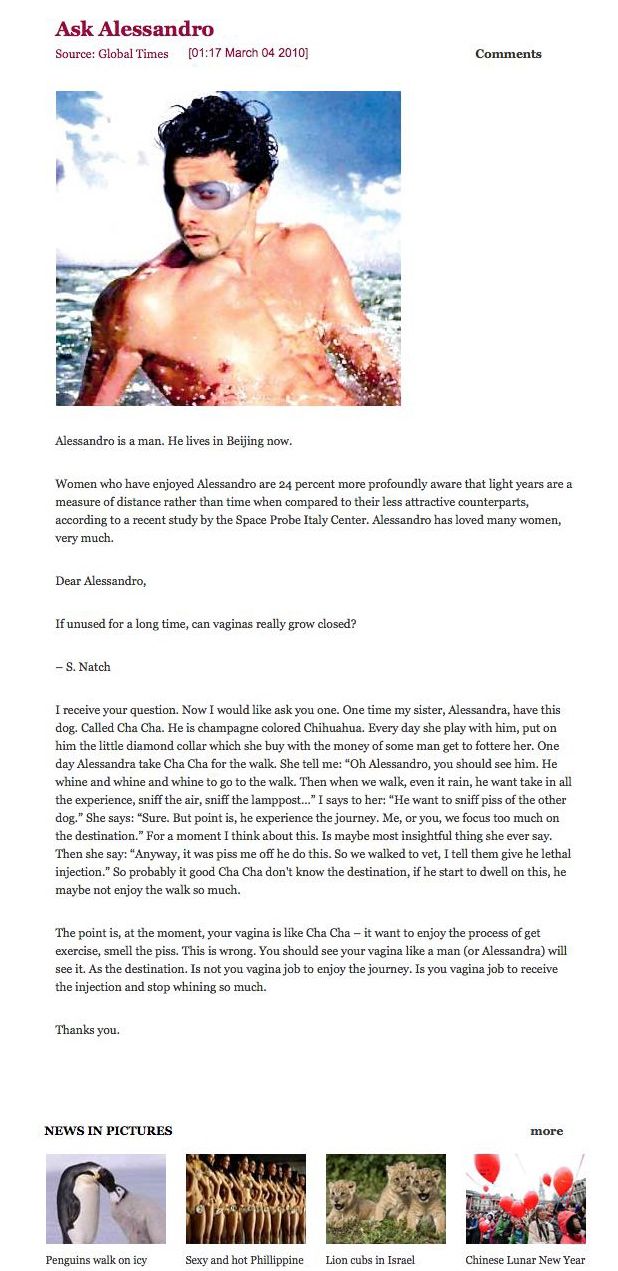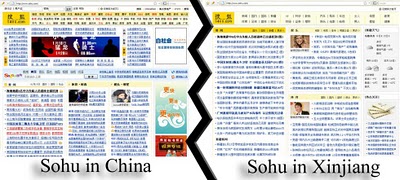On January 5 I started to write a post about an interview I heard on NPR’s always excellent Diane Rehm show with John Naisbitt, the author of the famous book Megatrends, and his wife Doris, who were there to plug their new book, China’s Megatrends: The 8 Pillars of a New Society. (You can listen to the entire interview here; scroll down a bit).
I never finished that post. I put it aside because John and Doris got me so incensed I decided it would be better to leave it alone than to write in the heat of passion and regret it later. (And I was not the only one to find this interview shocking for its unabashed brown-nosing and apologism.)
Then today I saw another interview with the two self-proclaimed China gurus and this time I decided to finish the post.
Let me preface my thoughts by saying this: I try to give China credit for its accomplishments. Several posts down you’ll find a piece about this being “China’s century.” But I also can’t ignore the bad, and thus below you’ll also find a post on the censorship of China’s Internet. I’m a big believer in trying to see beyond the box each of us has has created for himself, the one with all our assumptions and prejudices and beliefs, etc. I really do want to see the whole picture, and longtime readers know I’ve been willing to question my own POV in order to give China a fair chance. It’s absolutes about China (and the US) that make me cringe: “good,” “evil,” etc.
The Naisbitts’ creds sound good. They’ve lived in China for a decade. Doris Naisbitt is a professor at Yunnan University. Her husband was assistant secretary of education under JFK and is definitely a “futurist” of vast influence, Megatrends being one of the business bibles of the 1980s.
During the Diane Rehm interview, the first alarm sounded when Doris tried to argue that a key reason for China’s blocked web sites was pornography, the implication being the GFW is actually a good thing, supported by China’s citizens. John chimes in about how censorship is used to ensure “harmony,” something he seems to see as benign paternalism. Doris also argues that we hear negative things about China mainly because the Western media can’t resist “gossiping” about China because it is doing so well. Jealous neighbors.
This was just the start of a string of sugar-coated excuses for Chinese repression. Did you know Liu Xiaobo was arrested not for speaking out but for “organizing an alternative government”? I couldn’t believe what I was hearing.
Okay, so on to their more recent interview in The Spiegel. It starts with a question about the Google controversy and whether Google’s doing the right thing by considering leaving China.
John Naisbitt: They’ve broken a contract. In order to get a license, they agreed not to allow searches on certain subjects. And now, four years later, they say ‘we won’t do this anymore because we’ve been hacked.’ In Russia, hackers are much more vigorous and plentiful, but Google has said nothing. The company has a big market share there whereas in China it doesn’t. Google is breaking the contract and it’s blaming it on something else.
SPIEGEL ONLINE: So you think it’s a PR stunt?
Doris Naisbitt: We cannot say that, but it’s a gift! Look what a wonderful marketing effect this has for Google — being the David fighting Goliath.
John Naisbitt: Say it’s a PR stunt — it couldn’t have succeeded any better. Because here you have US Secretary of State Hillary Clinton getting on Google’s side, not understanding the contractual situation, and making the Internet one of the foreign policy planks of the administration. That’s not a bad thing. But it went from a contractual disagreement to the secretary of state becoming a spokesperson for Google.
SPIEGEL ONLINE: Does the Chinese government respond to external pressure, whether from a company like Google or the US government?
John Naisbitt: They are built to resist outside pressure. They really resent being jerked around. They resent Google putting them in a position where it looks like it’s their fault when Google is the one that initiated this challenge. I think they’re really pissed off. In China, when you make a deal, you never sign anything, you just shake hands. It’s all based on trust. But if you break that, you’re dead in the water. This breaking of trust is a really big deal for the Chinese.
This is thoroughly in line with the NPR interview. It is China that’s under assault from ungrateful multinationals, pesky activists and others who refuse to respect the status quo, despite its inherent repressive tendencies. Google’s motivations are self-aggrandizement and a desire to get out of a contract they didn’t like. Slimeballs, that Brin and Page! And “we can’t say it was a PR stunt, but…” Slick, very slick. I half-expected them to say Google launched the cyber-attacks on itself. Not a word about the hacked gmail accounts of human rights activists, whom the Naisbitts most likely see as ungrateful vermin.
Some of the points they go on to make are true. China’s system does allow its rulers to move ahead and get things done, and they have made enormous progress. Yes, we all know that. What bugged me, however, is their fawning, China-can-do-no-wrong attitude, wherein Google and Liu Xiaobo and the Western media are the only bad guys, while poor misunderstood China nobly moves forward, transcending the noise and the attempts to bring her down.
The earlier link I gave is a must-read to see what these two are up to and to see just how cozy they are with China’s top brass, especially in the State Council Information Office (i.e., propaganda department). And don’t miss the quote from the Guangzhou author who notes that nearly all of their sources are CCP reports and party-line-toeing Chinese newspaper articles, with next to no first-hand observations or original research.
Something about this simply doesn’t smell right. Either they are incredibly naive or incurious, or they’ve been bought and paid for. Just like our friend, they point to the exact same Pew Research poll he does to tell us how happy the Chinese are:
What does democracy mean? Rule of the people. In China, they respond to the people’s wishes. You may not believe that, but a study done by the Pew Research Center found that the Chinese government has an 89 percent approval rating. There is a lot of openness and freedom. The entrepreneurs and the artists, they love it. The energy it releases is palpable in China.
Yes, there’s a lot of energy in China, and some very, very happy artists. Most people in China support their central government. If an election were held today they’d elect the same leaders (though the one-party system has made any alternative an impossibility). China’s doing better, it’s richer, it’s powerful, it’s in many ways the greatest rags to riches story ever told. But looking at geniuses like Naisbitt and Rein you’d never know there was corruption and repression that not infrequently results in violence, and appalling abuse of the disenfranchised. You’d never know of the plight of the truly poor, and of a potential environmental catastrophe that could bring all that progress to its knees. It is so one-sided and so suck-uppish it’s nauseating.
If there is one book I am not going to lay down money for it’s China’s Megatrends. Luckily some customer reviewers over at Amazon are already onto them and call out their one-sidedness.
Keep a watchful eye on the Naisbitts, and take whatever they say in China’s Megatrends with a mega-grain of sea salt.



Comments